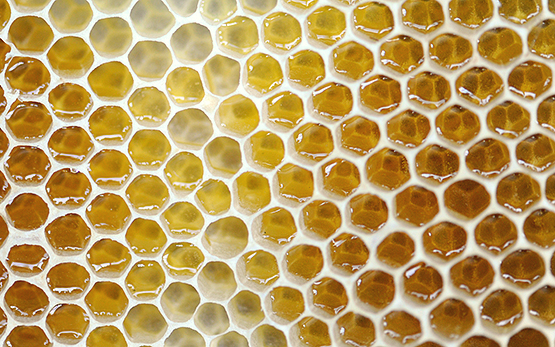Der Wassergehalt des von den Pflanzen produzierten Nektars kann variieren. Um seine Konservierung in den Waben zu gewährleisten, darf er nicht gären. Deshalb wird er von den Bienen in Honig umgewandelt, indem sie seinen Wassergehalt senken und folglich den Zuckergehalt erhöhen. Dies verhindert die Entwicklung der Mikroorganismen. In der Dunkelheit des Bienenstocks ist es schwierig, den Herstellungsprozess des Honigs zu beobachten. Aus diesem Grund ist er auch nur wenig erforscht. Um die Umwandlung von Nektar in Honig zu untersuchen, haben wir die Technik der Tomographie eingesetzt. Sie ermöglicht es, den Zuckergehalt des eingelagerten Nektars sehr präzise zu messen, ohne den Bienenstock öffnen zu müssen und das Bienenvolk zu stören.

Christian Ahrens
Bioinformatician
PhD
Research Group
- 22.00.13.10 Molecular Ecology
Role
Team leader Microbial Genomics and Bioinformatics
Steering committee bioinformatics network Agroscope (scientific lead)
Group Leader Bioinformatics and Proteogenomics (SIB, Swiss Institute of Bioinformatics)
Organisational Unit
Competence Division Method Development and Analytics
Agroscope-ID: 7677 Sending by e-mail
Christian Ahrens
Christian Ahrens
Projects
- 22.08.13.10.02
- 22.08.13.10.01
- 22.05.16.04.01
- 22.08.18.03.05
- 22.09.18.09.01
- 22.09.18.07.02
- 22.15.19.05.01
Christian Ahrens
Activities
Analysis of microbiomes and of the functionally most relevant isolates following the overarching theme “from genome to function”
Portfolio: Bioinformatic analysis and integration of functional genomics data types (genome sequences, transcriptomics, proteomics and metabolomics data, etc.), including also comparative genomics analyses. Participation in national and international research consortia (e.g. on the analysis of compost microbiomes, the analysis and characterization of biocontrol strains with the aim to reduce pesticide use and of plant growth promoting strains). Synergies with 3rd party funded research: development of integrated model systems to elucidate the development of antibiotics resistance and biofilm formation; development of methods to improve accurate and comprehensive genome annotation of prokaryotic organisms; identification of novel biocontrol genes and peptides with antimicrobial function.
Thematic focus: prokaryotes, biocontrol, plant growth promotion, plant-microbe interaction, fermented foods, antibiotic resistance and biofilm formation
Methodologial focus: De novo genome assembly, synergy genomics and metagenomics, transcriptomics, proteomics, integrated data analysis, unravel mechanisms of action
Selected publication repositories






